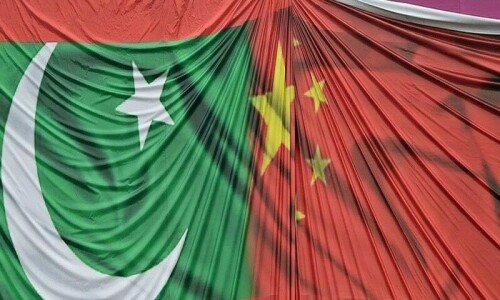ISLAMBAD: Finance Minister Miftah Ismail on Wednesday said the government was amending the laws to enable the sale of shares of listed state-owned entities (SOEs) with a buyback option to friendly countries on a government-to-government (G2G) basis and help bridge a part of $4bn financing gap estimated by the International Monetary Fund (IMF) for the current fiscal year.
Speaking at a seminar on SOEs corporate governance, the minister also said the ban on imports would be lifted in a couple of weeks and all prior actions agreed upon under the staff-level agreement with the IMF had been completed and there was no more hitch to be able to get the first tranche in the later part of August.
Without naming the Inter-Government Commercial Transaction Act 2022 that the federal cabinet approved later in the day, the finance minister said the law was necessary because the existing privatisation law did not allow such commercial transactions on a G2G basis.
An official statement after the cabinet meeting said the cabinet approved ‘Inter-Government Commercial Transaction Act 2022’ presented by the ministry of law and justice and referred it to the relevant standing committee of the parliament. The cabinet was informed that the law would provide confidence to foreign investors and also increase foreign investment on a G2G basis in developmental agreements. The meeting was told that it was for the first time that practical step was being taken to protect G2G agreements and make them transparent.
Laws, not people, need to be changed to make state firms work efficiently, says Miftah
The minister also talked at length about the prior actions committed with the IMF for the revival of its programme and said the government would be lifting the ban on imports in a couple of weeks because it created difficulties for the people. Mr Ismail said Pakistan had a persistent issue with the SOEs as some of them were badly managed and while some of them were important for service delivery but even those were not providing services and were rather creating problems in the budget.
Mr Ismail said that most of the SOEs had professional people running them as he had personal experience working with boards of PIA, Sui Southern Gas Company and so were others like OGDCL and power distribution companies. Yet they were not able to perform which meant that maybe laws and governance structures restrict their ability to perform. Therefore, the country perhaps needed better law and governance structures to make such entities perform or better ways to expedite their privatisation.
He said there had been no progress on privatisation either over the past decades. A small bank has been losing money since 2007 and on the privatisation list since 2008 but there may be something wrong with laws that it continues to bleed and could not be privatised. Likewise, Roosevelt Hotel in New York has been on the active privatisation list for 26 years since 1996.
He said the country faced an LNG shortage because the ministers and officers in the previous government were scared of the National Accountability Bureau and its law to take decisions and book future orders. On the other hand, such a law also provided an excuse to the people not to work or take decisions which had a huge cost to the nation.
He said NAB had been in place for 20 years but the level of corruption or perception of it did not go down. Similarly, there had been Public Procurement Regulatory Authority (PPRA) and its laws for more than 20 years but he did not know if procurement costs had been lower and things get better than they were before PPRA.
The reason was that these laws were a straightjacket and provided some people an excuse not to work. Therefore, the change in SOEs-related laws would be made “appropriately to sell SOEs shares to a friendly country through a stock exchange” and two LNG-based power projects owned by the federal government — Balloki and Haveli Bahadur Shah — to another friendly country.
Mr Ismail despised that even though talks for these transactions had not begun, some people had started criticising the sale of “family silver”. “We are only selling shares traded at the stock exchange and only a little bit of each of them. We are not selling majority shares or ownership shares and we are selling a small number of shares on buyback option,” he said, adding that the government could buy back those shares at a later stage if it so desires with improved economic conditions.
Published in Dawn, July 28th, 2022














































